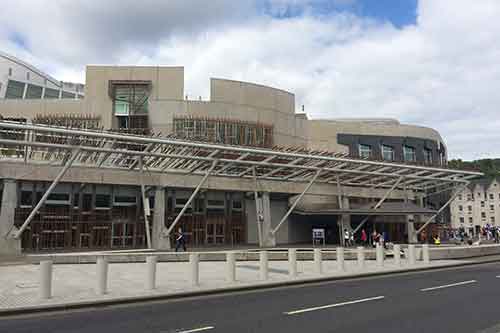Monday April 26th 2021

Scotland’s public finances are in dire straits. The longer the country goes on living above its means, the harder it is to fix. If not fixed, the burden will be a millstone around the necks of the children. Vanguard Party will not make imprudent promises to spend ever more money on public services, putting the country deeper in debt.
In 2019-20 Public Sector Revenue was £66bn, while Public Sector Expenditure, including Capital Investment, was £81bn, resulting in a Fiscal Deficit of £15bn. Accordingly, Scotland ran a Fiscal Deficit of minus 8.6% of Scotland’s GDP. For comparison, the UK as a whole ran a Fiscal Deficit of minus 2.6% of UK’s GDP.
The main source of funding is the Barnett block grant. For 2019-20, the last year not to include funding for Coronavirus, that was £33.2bn (approx. £28.5bn resource spending; £4.5bn capital spending), before adjustments. There was an upwards adjustment of £289m for welfare expenditure and a downwards adjustment of £12.2bn for Scottish income tax, stamp duty and landfill tax, to reflect that devolved administrations are responsible for devolved welfare spending and retain revenues from devolved taxes. Accordingly, the adjusted block grant was £21.3bn.
The figures for 2019-20 expose the fallacy that Scotland would prosper as an independent country. While it would retain 100% of Public Sector Revenue, it would have to deal with the deficit, either by reduced spending, increased taxes or increased borrowing. The deficit is currently made up through the block grant that would end with independence. Scotland would also become responsible for all welfare payments currently paid by the Treasury and have to assume its share of the UK’s national debt.
The figures for 2019-20 expose the fallacy that Scotland would be admitted to the EU. To qualify for EU membership Scotland must have a deficit of minus 3% or better, otherwise it will be subject to the EU’s Excessive Deficit Procedure that will impose higher taxes and/or lower public spending and potentially sanctions. As noted above, in 2019-20 Scotland ran a Fiscal Deficit of minus 8.6% of Scotland’s GDP .
| Scotland: Revenue, Expenditure & Deficit | 2019-20 |
| Public Sector Revenue (taxes raised in Scotland), incl. North Sea (geographical share) | £65.878bn |
| Public Sector Expenditure
incl. capital investment |
£81.015bn |
| Net Fiscal Balance
incl. North Sea (geographical share) incl. capital investment |
-£15.136bn |
| Net Fiscal Balance as % of GDP
incl. North Sea (geographical share) incl. capital investment |
-8.6% |
| UK Net Fiscal Balance as % of GDP
incl. capital investment |
-2.6% |
| Source: Government Expenditure & Revenue Scotland
August 2020 |
|
| Scotland: Barnett Block Grant | 2019-20 |
| Block grant before tax/welfare adjustments | £33.202bn |
| Total block grant adjustment | -£11.903bn |
| Of which tax deductions | -£12.193bn |
| Of which welfare additions | £0.289bn |
| Total block grant after adjustments | £21.298bn |
| Source: H.M. Treasury Block Grant Transparency
July 2020 |
|